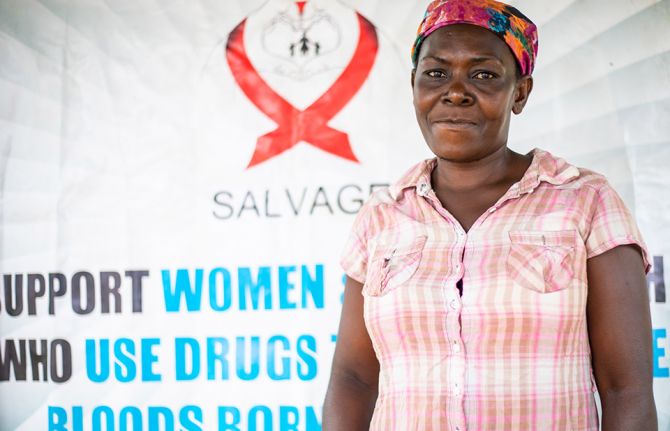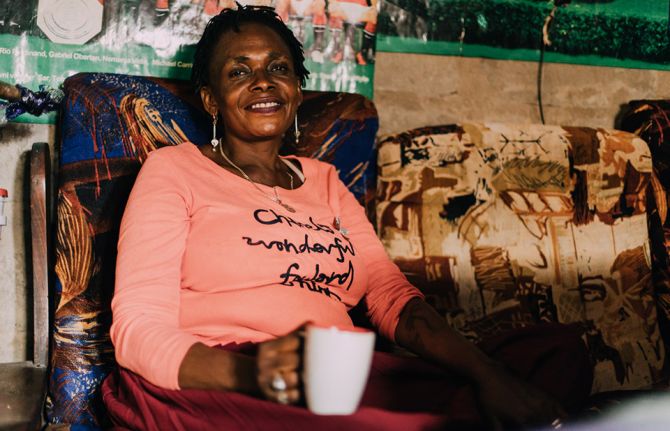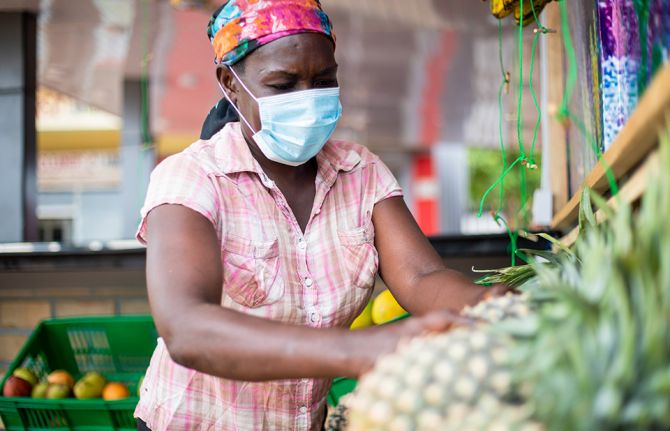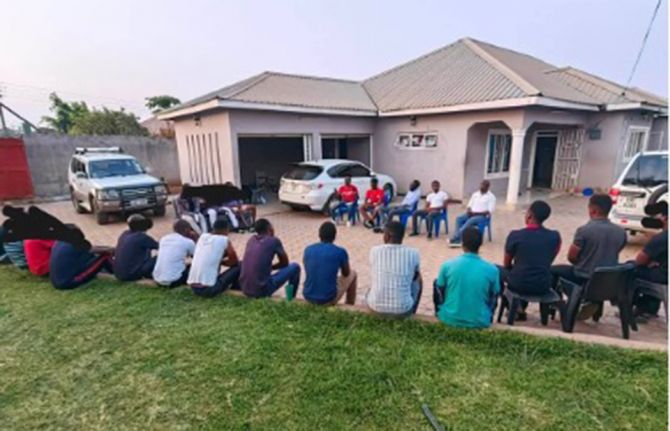



Feature Story
Tanzanian community-based organizations support women who use drugs
05 October 2020
05 October 2020 05 October 2020Community-based organizations in Dar es Salaam, United Republic of Tanzania, with assistance from UNAIDS, are supporting women who use drugs and their families to survive during these difficult times.
“Before the pandemic, life was simple and better. I used to do activities at the beach, such as cleaning fish, helping people load and clean their boats, and they would pay me. I would help my daughter wash her clothes; I would escort her to school and cook food for her. Life was simple,” said Doroth Hassan as she sits in the office of SALVAGE, a sister organization of the Tanzania Network for People who Use Drugs (TaNPUD), in Kigamboni, Dar es Salaam.
Ms Hassan would normally provide for herself and her daughter by doing sex work and other informal jobs, such as the work on the beach. But this has become a challenge since the onset of the COVID-19 pandemic.
“Now life has changed. I live in fear and worry. People who I worked for don’t want to pay, with the excuse that they have no cash because of the coronavirus. Everything changed. Life is tough. Clients disappeared, vanished. And the few who are still coming cheat; they pay less for sex,” said Ms Hassan.
She is not alone in her worry. Most of the women who use drugs in Dar es Salaam survive in the same way as Ms Hassan does, by doing sex work, trading and doing other jobs in the informal sector. They live in camps for people who use drugs or in informal and densely populated settlements.
With support from UNAIDS and other partners, local community-based organizations, including TaNPUD and SALVAGE, have been able to provide some relief to women in the camps and settlements in Dar es Salaam.
“TaNPUD raised awareness and SALVAGE provided buckets, soap and food with other hygiene materials to us and other women in the community. TaNPUD always advocates for our health rights,” said Oliver Kinanda, a person who previously used drugs and is now on opioid substitution therapy.
Ms Kinanda also volunteers at the Medication-Assisted Treatment (MAT) clinic in Temeke, where she lives. Here, she informs people on prevention of tuberculosis (TB) and takes samples from clients for TB screening. With the onset of COVID-19, however, her tasks have shifted.
“As a peer educator I have knowledge of prevention of COVID-19 and provide education and awareness. Together with other people who use drugs I also got help; for example, face masks,” said Ms Kinanda. She has also received information and support from other local community-based organizations, including donations to the community and the clients she works with in the Temeke MAT clinic.
Ms Hassan received the same support.
“TaNPUD is raising a voice on our behalf, and SALVAGE, as the sister organization of TaNPUD, supporting women, has been linking us to care and treatment with other services and providing shelter, food and hygiene support to us,” she said.
The support, distributed with financial and material assistance from UNAIDS, will help to alleviate some of the consequences of the global pandemic, even as the effects of COVID-19 are slowly wearing off in the United Republic of Tanzania.
Happy Assan, the Coordinator of TaNPUD, said this support has so far reached 55 families of women who use drugs in Dar es Salaam.
“The support covered food and hygiene needs. It also provided women with the ability to stay at home instead of going out, for example to do sex work, and to negotiate less risky sex. The support reduced fear and worry about meeting the food needs of families with children,” said Ms Assan.
Many of the women who use drugs are living with or at risk of HIV infection and depend on reliable access to treatment and care, including harm reduction services. Despite the support in the community, some services that the women who use drugs depend on have been halted.
“Harm reduction services have been interrupted; they are less. No condom distribution or other commodities, only needle and syringes distribution. At least now SALVAGE is helping with sanitary items. At hospital there is no other support; HIV treatment only,” explained Ms Hassan.
Ms Hassan and Ms Kinanda both recount facing increased stigma during the pandemic—some derived from unintended consequences of the support, since the face masks they received were a certain colour, making the wearer identifiable in the local community as a person who uses drugs. Stigma and discrimination at hospitals is also reportedly high, adding to the difficulties of accessing services. But most difficult is the financial loss because of the pandemic.
As Ms Kinanda puts it, “No clients, no pay. Financially it is hard because my clients say they have no cash because the coronavirus has affected their jobs. I continue providing awareness and education to the community and my family too. I financially suffer, but what can I do other than continue pushing on?”



